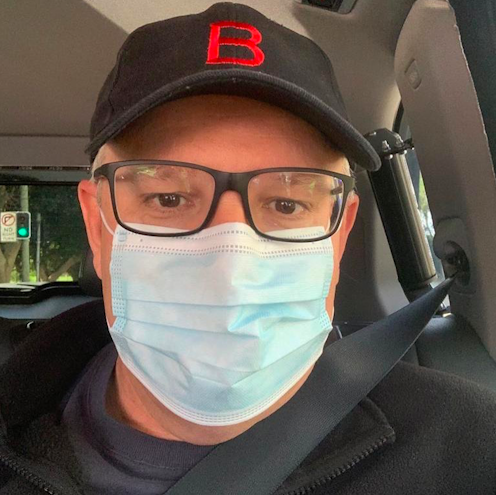View from The Hill: COVID has brought us a state in disaster and a prime minister in a mask
- Written by Michelle Grattan, Professorial Fellow, University of Canberra

As Melbourne moved to an extraordinary 8pm to 5am daily curfew and Stage 4 restrictions, and Victoria declared a “state of disaster”, Scott Morrison took to social media with a message for the embattled residents.
Read more: Explainer: what is a 'state of disaster' and what powers does it confer?
“Australians all around the country are backing you in, because we all know for Australia to succeed, we need for Victoria to get through this,” he said.
The Victorian lockdown has not just become drastically harsher - it is now due to run through until September 13.
Before Sunday’s announcement, Victoria was half way through its softer lockdown.
But that was not going to do its job, according to Premier Daniel Andrews, who had spent day after day imploring people to stay within the rules.
If tougher restrictions weren’t imposed, Andrews reckoned it would take until the end of the year before Victoria would be back seeing daylight.
“That’s a six-month strategy that is simply not going to work,” Andrews said. “Therefore we have to do more and do more right now.”
Andrews had no choice. The latest Victorian tally was 671 new cases and seven deaths. There are some 760 “mystery” active cases where the sources could not be traced.
Goodness knows, however, what sort of shape Victoria will be in by mid September, or Australia as a whole, for that matter.
The Victorian economy will be prone. On Monday we will get the details of which areas of business will be cut back or shut down by the government. Many others will be knocked off their feet, temporarily or in some cases permanently, by the stronger general restrictions on activity.
Treasury will be once again going back to its budget figures that last week were already out of date, just a week after they were unveiled.
Andrews is looking for some special Commonwealth help for Victoria. Nothing specific seems on or off the table. But the strong message from the federal government is that any such assistance should be on a 50-50 basis with Victoria.
The tougher lockdown, particularly targeting younger people who move around a lot and may be spreading the virus without showing symptoms, will test the resilience and compliance of a stressed community.
It’s already testing the political restraint of some Coalition politicians. Deputy Prime Minister Michael McCormack, while saying he wasn’t out to whack Andrews with a baseball bat, lamented that tighter restrictions hadn’t been imposed on Melbourne earlier.
Morrison was taking a low public profile at the weekend, apart from social media messaging including an Instagram picture of him wearing a mask. He explained he’d “had to pop out to pick up a few things here in Sydney, so followed the NSW Premier’s advice announced earlier today (and put a mask on in the car before heading into the shops).”
Meanwhile on Saturday he had sent a letter to West Australian premier Mark McGowan, capitulating over the Commonwealth’s participation in the court challenge to WA’s closed border.
Morrison said he was pulling the government out of the High Court case, which has been brought by Clive Palmer.
After concerted attacks on the WA government last week by him and senior ministers from WA, Christian Porter and Mathias Cormann, the Prime Minister presumably recognised (or was told) that regardless of whether he was on the right side of the constitution he was certainly on the wrong side of public opinion.
McGowan has very high ratings - with a state election coming early next year - and the hard border is popular locally.
Morrison reiterated that the Commonwealth intervention in the case had been consistent with convention and its responsibilities in relation to the constitution. He said the government’s actions “have not been to support any private interest of the plaintiffs”.
“While taking our constitutional responsibilities seriously in seeking to respect established conventions, I also accept that recent events in the eastern states, especially Victoria, are creating real concerns to residents in other states less impacted,” he wrote.
“I do not wish to see these concerns further exacerbated in Western Australia.
"Having taken into account the changed state of the pandemic that has worsened since these matters were first brought to the High Court, the high level of concern regarding public health in the Western Australian community, and our desire to work with you cooperatively on a constitutionally sustainable way forward, I consider, on balance, that we must set aside the normal convention in these circumstances and not continue the Commonwealth’s participation in this case.”
Morrison proposed principles “to mitigate the Commonwealth’s concerns with how border issues within our Federation are managed”.
He said the federal government was not asking WA to change its present border setting – as things stood, that would give rise to “significant and unnecessary public concern”.
His principles proposed states should not act arbitrarily in restricting inter-state movement of Australian residents; any restriction should be in consultation with the Commonwealth on the basis of transparent advice about the need for it; affected states should be consulted, and there should be criteria and processes for regular assessment.
“I also want to stress the advice I receive from the Chief Medical Officer, that has also been regularly conveyed to National Cabinet, that border arrangements are no substitute for strong public health response capability and maintenance of social distancing principles,” Morrison wrote.
“If an outbreak were to occur in Western Australia, as has occurred in other states, it will be strength of your State’s testing, tracing and outbreak containment capabilities that will determine your success or otherwise.”
The tone of the letter indicated this had been a retreat made through gritted teeth behind a thin mask of congeniality.
Authors: Michelle Grattan, Professorial Fellow, University of Canberra




